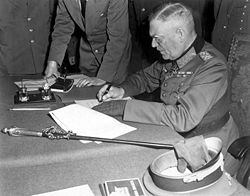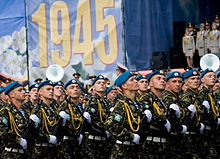- Victory Day (9 May)
-
For the song, see Den Pobedy.
Victory Day 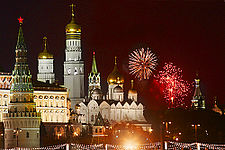
Victory Day celebrations in Moscow, 9 May 2005Official name Russian: День Победы, Den' Pobedy Observed by Armenia, Azerbaijan, Belarus, Bosnia and Herzegovina, Georgia, Germany, Israel, Kazakhstan, Kyrgyzstan, Moldova, Montenegro, Poland, Russia, Serbia, Tajikistan, Turkmenistan, Ukraine, Uzbekistan Date 9 May Naval warfare
- Baltic Sea
- Black Sea
- Arctic
1941
1942
- Battles of Rzhev
- Toropets and Kholm
- Demyansk
- Velikiye Luki
- Mars
- 2nd Kharkov
- Case Blue
- Stalingrad
1943
1944
- Dnieper and Carpathian
- Leningrad and Novgorod
- Narva
- Hube's Pocket
- Crimea
- Jassy-Kishinev
- Karelia
- Bagration
- Lvov and Sandomierz
- 2nd Jassy-Kishinev
- Baltics
- Debrecen
- Petsamo and Kirkenes
- Hungary
1945
- Vistula and Oder
- East Prussia
- East Pomerania
- Solstice
- Silesia
- Vienna
- Berlin
- Czechoslovakia
- German capitulation
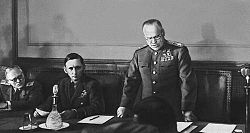 Marshal Zhukov reading the German capitulation. Seated on his right is Air Chief Marshal Arthur Tedder.
Marshal Zhukov reading the German capitulation. Seated on his right is Air Chief Marshal Arthur Tedder.
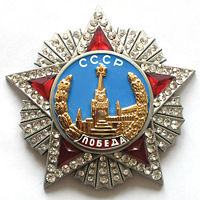 Soviet Order of Victory
Soviet Order of Victory
Victory Day[1] or 9 May marks the capitulation of Nazi Germany to the Soviet Union in the Second World War (also known as the Great Patriotic War in the Soviet Union and all post-Soviet states). It was first inaugurated in the fifteen republics of the Soviet Union, following the signing of the surrender document late in the evening on 8 May 1945 (after midnight, thus on 9 May, by Moscow Time). It happened after the original capitulation that Germany earlier agreed to the joint Allied forces of the Western Front. The Soviet government announced the victory early on 9 May after the signing ceremony in Berlin.[2] Though the official inauguration happened in 1945 (which means it has been celebrated since 1946), the holiday became a non-labour day only in 1965 and only in some of the countries.
In communist East Germany, a Soviet-style "Victory Day" on 9 May was an official holiday from 1975 until the end of the republic in 1990. Prior to that, "Liberation Day" was celebrated on 8 May, between 1950 and 1966, and again on the 40th anniversary in 1985. Since 2002, the German state of Mecklenburg-Vorpommern has observed a commemoration day known as the "Day of Liberation from National Socialism, and the End of the Second World War".[3]
In 1988,[citation needed] before the dissolution of the Soviet Union, Victory Day ceased to be observed in Uzbekistan, but was partially restored in 1999 as Memorial/Remembrance Day.[4] After their separation from the Soviet Union, the Baltic countries now commemorate the end of WWII on 8 May, the Victory in Europe Day.[5] But many people in Baltic countries still gather to celebrate the Victory Day on 9 May.
Contents
History
Two separate capitulation events took place at the time. First, the capitulation to the Allied nations in Reims was signed on 7 May 1945, effective 23:01 CET 8 May. This date is commonly referred to as the V-E Day (Victory in Europe Day) in most western European countries. The other World War II victory day, the V-J day (Victory in Japan Day) is commemorated in August, and is of considerably lesser significance in Europe.
However, the Soviet Union's only representative in Reims was General Ivan Susloparov, the Military Liaison Mission Commander. General Susloparov's scope of authority was not entirely clear, and he had no means of immediate contact with the Kremlin, but nevertheless decided to sign for the Soviet side. Susloparov was caught off guard; he had no instructions from Moscow. But if he did not sign, he risked a German surrender without Soviet participation. However, he noted that it could be replaced with a new version in the future. Joseph Stalin was later displeased by these events, believing that the German surrender should have been accepted only by the envoy of the USSR Supreme command and signed only in Berlin and insisted the Reims protocol be considered preliminary, with the main ceremony to be held in Berlin, where Marshal Zhukov was at the time, as the latter recounts in his memoirs:[6]
“ [Quoting Stalin:] Today, in Reims, Germans signed the preliminary act on an unconditional surrender. The main contribution, however, was done by Soviet people and not by the Allies, therefore the capitulation must be signed in front of the Supreme Command of all countries of the anti-Hitler coalition, and not only in front of the Supreme Command of Allied Forces. Moreover, I disagree that the surrender was not signed in Berlin, which was the center of Nazi aggression. We agreed with the Allies to consider the Reims protocol as preliminary. ” Therefore, another ceremony was organized in a surviving manor in the outskirts of Berlin late on 8 May, when it was already 9 May in Moscow due to the difference in time zones. Field-Marshal Wilhelm Keitel submitted the capitulation of the Wehrmacht to Marshal Georgy Zhukov in the Soviet Army headquarters in Berlin-Karlshorst. To commemorate the victory in the war, the ceremonial Moscow Victory Parade was held in the Soviet capital on 24 June 1945 (four years and two days after the beginning of Operation Barbarossa - the invasion of the Soviet Union).
Celebration
During the Soviet Union's existence, 9 May was celebrated throughout the USSR and in the countries of the Eastern Bloc. Though the holiday was introduced in many Soviet republics approximately between 1946 and 1950, it only became a non-labour day in Ukrainian (1963) and Russian (1965) SSRs. In the latter one, a weekday off (usually a Monday) was given starting 1966 if 9 May was to fall on a weekend (Saturday or Sunday).
The celebration of Victory Day continued during subsequent years. The war became a topic of great importance in cinema, literature, history lessons at school, the mass media, and the arts. The ritual of the celebration gradually obtained a distinctive character with a number of similar elements: ceremonial meetings, speeches, lectures, receptions and fireworks.[7]
After the fall of the communism in Central and Eastern Europe, most former USSR countries retained the celebration, though it was not formally celebrated by some of them. In Russia during 1990s the May 9 was not celebrated massively, because Soviet-style mass demonstrations did not fit in with the way in which liberals who were in power in Moscow communicated with the country’s residents. The situation changed when Vladimir Putin came to power. He started to promote the prestige of the governing regime and history, national holidays and commemorations all became a source for national self-esteem. Since then the Victory Day in Russia has increasingly been turning into a joyous celebration in which popular culture plays a great role. The celebration of the 60th anniversary of Victory Day in Russia in 2005 became the largest national and popular holiday since the collapse of the Soviet Union.[7]
Countries in which 9 May is celebrated
 Armenia has officially recognised 9 May since 1946;
Armenia has officially recognised 9 May since 1946; Azerbaijan has officially recognised 9 May since 1946;
Azerbaijan has officially recognised 9 May since 1946; Belarus has officially recognised 9 May since 1946 and considered it non-labor in the past;
Belarus has officially recognised 9 May since 1946 and considered it non-labor in the past; Bosnia and Herzegovina has officially recognised 9 May as the Victory Day over Fascism and considers it a non-working day.[8]
Bosnia and Herzegovina has officially recognised 9 May as the Victory Day over Fascism and considers it a non-working day.[8]- British Channel Islands of
 Jersey and
Jersey and  Guernsey were not liberated from German occupation until 9 May 1945, and
Guernsey were not liberated from German occupation until 9 May 1945, and  Sark on 10 May 1945, and celebrate those dates as their Liberation Days.
Sark on 10 May 1945, and celebrate those dates as their Liberation Days.  Georgia has officially recognised 9 May since 1946;
Georgia has officially recognised 9 May since 1946; German Democratic Republic recognised Tag des Sieges (Victory Day) on 9 May as a public holiday between 1975 and the end of the republic in 1990. Earlier, the Tag der Befreiung (Day of liberation) was celebrated on 8 May as a public holiday, from 1950 to 1966, and on the 40th anniversary in 1985.
German Democratic Republic recognised Tag des Sieges (Victory Day) on 9 May as a public holiday between 1975 and the end of the republic in 1990. Earlier, the Tag der Befreiung (Day of liberation) was celebrated on 8 May as a public holiday, from 1950 to 1966, and on the 40th anniversary in 1985. Germany does not officially recognise 9 May as a holiday. However, celebrations continue to take place in some areas of the former German Democratic Republic. Also, on 8 May, the German state of Mecklenburg-Vorpommern since 2002 has recognised a commemorative day Tag der Befreiung vom Nationalsozialismus und der Beendigung des 2. Weltkrieges (Day of Liberation from National Socialism, and the End of the Second World War).
Germany does not officially recognise 9 May as a holiday. However, celebrations continue to take place in some areas of the former German Democratic Republic. Also, on 8 May, the German state of Mecklenburg-Vorpommern since 2002 has recognised a commemorative day Tag der Befreiung vom Nationalsozialismus und der Beendigung des 2. Weltkrieges (Day of Liberation from National Socialism, and the End of the Second World War). Israel has officially recognised 9 May since 2000.
Israel has officially recognised 9 May since 2000. Kazakhstan has officially recognised 9 May since 1947. It's a non-working day. The holiday is sometimes celebrated in connection with other national holidays on 10 and 11 May.
Kazakhstan has officially recognised 9 May since 1947. It's a non-working day. The holiday is sometimes celebrated in connection with other national holidays on 10 and 11 May. Kyrgyzstan has officially recognised 9 May since 1946;
Kyrgyzstan has officially recognised 9 May since 1946; Moldova has officially recognised 9 May since 1951;
Moldova has officially recognised 9 May since 1951; Poland celebrated since 1945 (until 1950 non-labour day)
Poland celebrated since 1945 (until 1950 non-labour day) Russia has officially recognised 9 May since 1946 and considers it a non-working day even if it falls on a weekend (in which case any following Monday will be non-working);
Russia has officially recognised 9 May since 1946 and considers it a non-working day even if it falls on a weekend (in which case any following Monday will be non-working); Serbia celebrates 9 May as the Victory Day over Fascism but it's a working holiday. Still many people gather to mark the anniversary with the war veterans, including Serbian army, Minister of Defense and the President.
Serbia celebrates 9 May as the Victory Day over Fascism but it's a working holiday. Still many people gather to mark the anniversary with the war veterans, including Serbian army, Minister of Defense and the President. Tajikistan has officially recognised 9 May since 1946;
Tajikistan has officially recognised 9 May since 1946; Turkmenistan has officially recognised 9 May since 1946;
Turkmenistan has officially recognised 9 May since 1946; Ukraine has officially recognised 9 May since 1946 and considers it a non-working day even if it falls on a weekend (in which case any following Monday will be non-working);[9]
Ukraine has officially recognised 9 May since 1946 and considers it a non-working day even if it falls on a weekend (in which case any following Monday will be non-working);[9] Uzbekistan has officially recognised 9 May from 1946 until 1988. Starting 1999, the holiday was restored as "Memorial/Remembrance Day;.[4]
Uzbekistan has officially recognised 9 May from 1946 until 1988. Starting 1999, the holiday was restored as "Memorial/Remembrance Day;.[4] Yugoslavia officially recognised 9 May as the Victory Day over Fascism as an all-state non-working holiday.
Yugoslavia officially recognised 9 May as the Victory Day over Fascism as an all-state non-working holiday.
Russophone populations in many world countries celebrate the holiday regardless of its local status. Many Russian communities in United States and Canada, also for example in Estonia, Latvia, Lithuania[10] organize public gatherings and even parades on this day.[11] In Europe, some multilanguage broadcasting television chains translate the "Victory speech" of the Russian president and the parade on Red Square.[12]
Soviet and post-Soviet symbols associated with the Victory Day
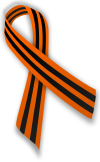 The ribbon of Saint George. This is worn in a manner to celebrate the holiday
The ribbon of Saint George. This is worn in a manner to celebrate the holiday
- Victory Banner
- Ribbon of Saint George, colloquially known as George's Ribbon (Георгиевская ленточка): originally associated with the Order of St. George (officers) and the St. George Cross (enlisted ranks) of the Russian Empire, the nation's highest award for military valor. It was reintroduced in the Soviet Union and used for the Order of Glory and the Medal For the Victory Over Germany in the Great Patriotic War 1941–1945. The Order of St. George was reintroduced in the Russian Federation in 2000 as a military award.
During the Victory Day parade 2010, President Dmitry Medvedev and many other VIPs were seen wearing the commemorative ribbon on the lapel of their jackets.
Soviet Union
Order of Victory Medal For the Victory Over Germany in the Great Patriotic War 1941–1945 Medal For the Capture of Berlin Medal for the 20th Anniversary of the Victory in the Great Patriotic War of 1941–1945 Medal for the 30th Anniversary of the Victory in the Great Patriotic War of 1941–1945 Medal for the 40th Anniversary of the Victory in the Great Patriotic War of 1941–1945 Russia
Medal for the 50th Anniversary of the Victory in the Great Patriotic War of 1941–1945 Medal for the 60th Anniversary of the Victory in the Great Patriotic War of 1941–1945 Ukraine
Medal for the 60th Anniversary of the Victory in the Great Patriotic War of 1941–1945 Kazakhstan
Medal for the 60th Anniversary of the Victory in the Great Patriotic War of 1941–1945 See also
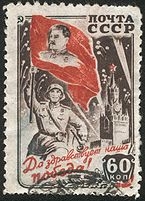 Stamp of USSR, 1945. The inscription on the bottom written in cursive, below the Soviet soldier waving the red flag with Josef Stalin on it, says,"Long live our victory!"
Stamp of USSR, 1945. The inscription on the bottom written in cursive, below the Soviet soldier waving the red flag with Josef Stalin on it, says,"Long live our victory!"
- 2008 Moscow Victory Day Parade
- End of World War II in Europe
- German Instrument of Surrender, 1945
- Minute of Silence
- Victory Day in other countries
- Victory in Europe Day
- Victory over Japan Day
- Hero city
- Pobediteli
References
- ^ (Russian: День Победы, Den' Pobedy; Ukrainian: День Перемоги, Den' Peremohy; Belarusian: Дзень Перамогі, Dzień Pieramohi; Kazakh: Жеңіс Күні, Jeñis Küni; Azerbaijani: Гәләбә ҝүнү; Georgian: გამარჯვების დღე; Lithuanian: Pergalės diena; Romanian: Ziua Victoriei; Latvian: Uzvaras diena; Tajik: Рӯзи Ғалаба; Estonian: Võidupäev; Tatar Cyrillic: Җиңү көне, Latin: Ciñü köne)
- ^ Ziemke Further readingCHAPTER XV:The Victory Sealed Page 258 last 2 paragraphs
- ^ Gesetz über Sonn- und Feiertage des Landes Mecklenburg-Vorpommern
- ^ a b "Their memory lives on"
- ^ "8 May: Memorial Day for the victims of World War II". Estonian Embassy in Washington. http://www.estemb.org/estonia/history/aid-776. Retrieved 7 August 2009.
- ^ Zhukov, Georgy (2002) (in Russian). Memoirs. Olma-Press. pp. 329.
- ^ a b See Ločmele, K., Procevska, O., Zelče, V. (2011). Celebrations, Commemorative Dates and Related Rituals: Soviet Experience, its Transformation and Contemporary Victory Day Celebrations in Russia and Latvia. In: Muižnieks, N. (ed.). The Geopolitics of History in Latvian-Russian Relations. Riga: Academic Press of the University of Latvia. http://www.szf.lu.lv/files/petnieciba/publikacijas/The%20Geopolitics%20of%20History%20in%20Latvian-Russian%20Relations.pdf
- ^ http://www.parlament.ba/download/zdocs/Prijedl.zak.+o+praznicima+BiH+i+neradnim+danima-B.pdf/def41ea7786c75e1d389ac1fdfead069
- ^ Lviv Oblast, however, does not recognize Victory Day, but rather recognizes the day as a memorial to all wartime victims of both the Soviet and Nazi regimes, as well as all of those caught in between.
- ^ " Estonia: Local Russians Celebrate End Of World War II", Radio Liberty, 9 May 2007
- ^ "Russian Orthodox Church in Toronto celebrates 9 May 2005"
- ^ "May 9 parade TV-event from Israel"
External links
 Works related to German Instrument of Surrender (7 May 1945) at Wikisource
Works related to German Instrument of Surrender (7 May 1945) at Wikisource  Works related to German Instrument of Surrender (8 May 1945) at Wikisource
Works related to German Instrument of Surrender (8 May 1945) at Wikisource- Interactive map of the Great Patriotic War between the USSR and Nazi Germany
- Tanks in the streets of Moscow as Russia prepares to put on a show of military might for 2010 Victory Day parade
- United in Victory Russia, the UK and the U.S. commemorated their WWII victory together on Red Square (slideshow)
 Public holidays in RussiaNew Year's Day/New Year · Defender of the Fatherland Day · International Women's Day · International Workers' Day · Victory Day · Russia Day · Unity Day
Public holidays in RussiaNew Year's Day/New Year · Defender of the Fatherland Day · International Women's Day · International Workers' Day · Victory Day · Russia Day · Unity DayAnnual Moscow Victory Parade By year 
Features Victory Banner · Flag of Russia · National Anthem of Russia · Ribbon of Saint George · Red Square · Russian Army · Russian Navy · Russian Air Force · Russian Airborne Troops · GRAU · Missile Forces of Strategic Importance · Federal Security Service of Russia · Ministry of Internal Affairs Internal Troops · Ministry of Emergency Situations · Russian Knights · Strizhi
Related Victory Day (9 May) · Eastern Front · Great Patriotic War
Categories:- Aftermath of World War II
- History of the Soviet Union and Soviet Russia
- Holidays in Russia
- Holidays in the Soviet Union
- May observances
- Victory days
Wikimedia Foundation. 2010.

